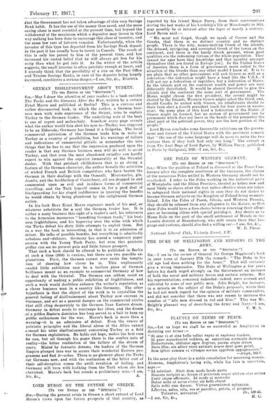GERMAN DISILLUSIONMENT ABOUT TURKEY. [To THE EDITOR OF THE "
SPECTATOR."] Sig,—May I draw the attention of your readers to a book entitled The Turks and the Germans After the War, written by a certain Ernst Marro and published at Berlin? This is a curious and rather disconnected book, in which the author, a German busi- ness man with wide experience of the Orient, tries to explain Turkey to the German trader. The underlying note of the book is one of regret and melancholy. Somehow every page reveals what the author would fain shut his eyes to—Turkey was supposed to be an Eldorado; Germany has found it a Golgotha. The lurid commercial patriotism of the German leads him to write of Turkey as a country of possibilities, but his warnings of failure and indications of commercial pitfalls so outnumber the nice things that he has to say that the impression produced upon the reader is that any German business man will do well to avoid Turkey, and that even the most abandoned swindler can hardly expect to win against the superior immorality of the Oriental dealer. With that petulant childishness that is so strong a feature of the German character, the author bewails the activities of wicked French and British competitors who have beaten the German in their dealings with the Osmanli. Missionaries, gin, Jesuits, and the Archbishop of Canterbury, all are dragged in and commented upon as evil and insidious forms of commercial travelling, and the Turk himself comes in for a good deal of blackguarding for his stupid indifference in ignoring the benefits he would obtain by being plundered by the enlightened German nation.
In his book Herr Ernst ,Barre expresses much of his soul, or whatever substitute for a soul the German trader has. It is rather a nasty business this sight of a trader's soul, his references to the Armenian massacres " benefiting German trade," his busi- ness frightfulness, and his hypocrisy over the wiles with which the Turks defeat his dirty little attempts to exploit them. But in a way the book is interesting, in that it is an admission of defeat. He talks of possible benefits, but everything is admittedly nebulous and—dubious. Germany has scored a temporary paper success with the Young Turk Party, but even this patriotic pedlar can see no present gain and little future prospect.
That such a book should be allowed to bo published in Berlin at such a time (1916) is curious, but there are two possible ex- planations. First, the German cannot ever resist the tempta- tion of showing how clever he is. This unpleasantly candid little exhibition may be a tactless piece of German brilliance meant as an example to commercial Germany of how to deal with the Oriental. The German can seldom resist an -opportunity of making a public exhibition of frightfulness, and such a work would doubtless enhance the writer's reputation as a clever business man in a country like Germany. The other hypothesis is that the object of the work is to crystallize the general feeling of disillusionment about Turkey now current in -Germany, and act as a general damper on the commercial circles that still cling desperately to the German Near Eastern dream. -Germany in defeat needs to rearrange her ideas, and the dream .of a golden Eastern dominion has long served as a bait to keep up public enthusiasm for the war. Marre's book is more than a ecarning—it is an admission of defeat. Even the veneer of patriotic principles and the liberal abuse of the Allies cannot .conceal his utter disillusionment concerning Turkey as a field for German exploitation. He holds out hope, makes the best ease lie can, but all through his pages there is the sombre noto of reality—the bitter realization of the failure of the dream of years. Misled by fantastic dreams, the leaders of the German Empire plunged into war to secure their wonderful Eastern pro- gramme and find it—ashes. There is no glamour about the Turks for Germans now, and with the realization of the bitter cost of their self-deception comes the swift revulsion of feeling, and 'Germany will turn with loathing from the Turk whom she has ,cherished. Marre's book but sounds a preliminary note.—I am,


































 Previous page
Previous page